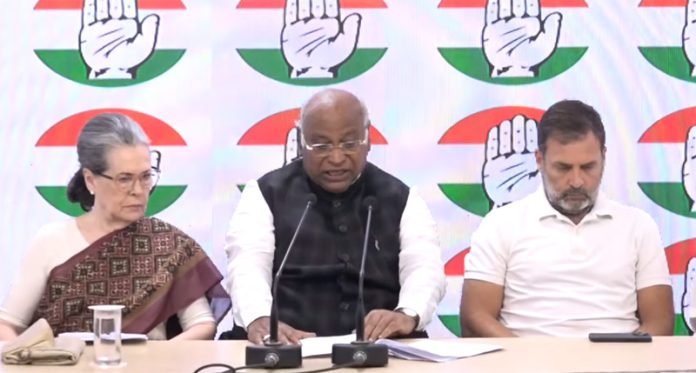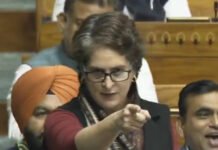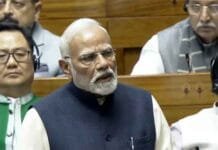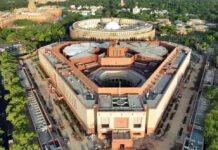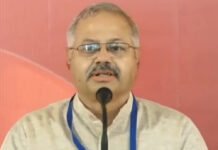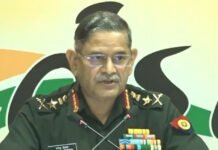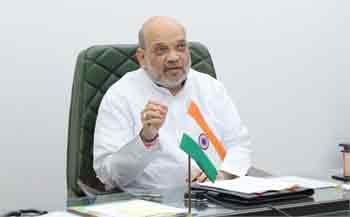As the Indian Parliament prepares for a special debate on the Pahalgam terror attack and Operation Sindoor, the opposition Congress has launched a scathing political offensive against the Modi-led NDA government. The party has raised serious concerns over national security lapses, alleged political interference, and foreign pressure—particularly spotlighting US President Donald Trump’s claims of halting the Indian military operation 26 times.
Congress Mobilizes Ahead of Parliament’s High-Stakes Debate
Ahead of the monsoon session debate, scheduled in the Lok Sabha on Monday and the Rajya Sabha on Tuesday, Congress has made a calculated move to frame the narrative. On Sunday, senior party leader Jairam Ramesh listed a series of developments related to Operation Sindoor, the April 22 Pahalgam terror attack, and controversial international statements that, until now, had largely stayed outside official deliberations.
In an aggressive social media post, Ramesh underscored the Congress’s earlier demand for an immediate two-day special session after the Pahalgam incident—an appeal the government initially ignored. The now-committed 16-hour debate, he said, may be delayed, but remains vital for national accountability.
Strategic Mistakes and Military Admissions Emerge
Congress’s offensive gains weight from rare admissions by top defense personnel. On May 30, Chief of Defense Staff General Anil Chauhan, speaking at a global defense forum in Singapore, publicly acknowledged strategic miscalculations during the initial 48 hours of Operation Sindoor. This stunning revelation was followed by another key statement.
On June 29, Group Captain Shiv Kumar, representing India at a summit in Indonesia, indicated political interference during the operation and further revealed that the Indian Air Force suffered operational setbacks. These candid disclosures have intensified calls for a transparent inquiry into the planning and execution of the counter-terror strategy in Kashmir.
Confrontation with China Raises National Concerns
Adding fuel to the fire, Lieutenant General Rahul Singh, Deputy Chief of Army Staff, dropped a diplomatic bombshell during a press interaction on July 4. Singh confirmed that India encountered technical and strategic friction with China in the course of Operation Sindoor. This statement has rekindled worries of a multi-front threat, with implications not just for Kashmir, but for India’s broader military preparedness.
These remarks directly contradict earlier government assertions that the situation was entirely under control and that foreign adversaries were being contained. With the official narrative increasingly in doubt, the Opposition is demanding a White Paper on Operation Sindoor.
Lieutenant Governor Accepts Security Failure
The accountability crisis deepened when Jammu and Kashmir’s Lieutenant Governor Manoj Sinha took public responsibility for the Pahalgam incident. On July 14, Sinha admitted that the terrorist ambush was due to a breakdown in security planning, a rare moment of candor from a top civilian authority in the region.
The Pahalgam attack claimed multiple lives, including those of brave paramilitary personnel, and caused a ripple of panic across the valley. Sinha’s statement provides further ammunition to the Congress’s assertion that institutional complacency and political micromanagement weakened India’s security apparatus.
Trump’s Trade Threats and Alleged Interference in Operation Sindoor
Perhaps the most explosive issue raised by Congress is former US President Donald Trump’s repeated claim that he personally thwarted Operation Sindoor 26 times by threatening India with a trade blockade.
The Congress party has termed these statements as “unprecedented international interference in India’s sovereign military decisions.” They argue that the Indian government’s failure to rebut Trump’s assertion reflects a dangerous silence on matters of national interest.
Moreover, Trump’s controversial invitation to the Pakistani Army Chief for lunch has been described by Congress as a diplomatic signal undermining India’s counterterrorism stance. That the US Central Command and State Department officials have praised Pakistan’s role in fighting terror while remaining silent on the Pahalgam attack has further alarmed Indian opposition leaders.
US-Pakistan Nexus: A Diplomatic Tightrope
Congress leaders are now openly questioning whether the Modi government has mishandled Indo-US and Indo-Pak relations during the crisis. With Washington seemingly playing both sides, Indian diplomats appear to be on the backfoot. Ramesh warned that strategic ambiguity by the United States could weaken India’s security objectives in the region, and demanded clear answers from the External Affairs Ministry.
The Role of Indian Media and Government Narrative Control
Another powerful point raised by Congress pertains to domestic media coverage during Operation Sindoor. Jairam Ramesh accused the Prime Minister’s Office of orchestrating a controlled narrative through “media managers,” aiming to downplay security failures and bolster the government’s image ahead of international summits.
By shaping the story for domestic consumption, the Congress alleges, the government not only misled citizens, but also undermined democratic accountability. The party is expected to demand a parliamentary investigation into media interference and censorship during Monday’s session.
Congress Gears Up for a Showdown in Parliament
With Monday’s debate looming, Congress has assembled a high-powered delegation of speakers for the Lok Sabha and Rajya Sabha sessions. According to insiders, the opposition’s focus will revolve around:
Demanding a high-level inquiry into the failures during Operation Sindoor
Holding the government accountable for ignoring early warnings and intelligence inputs
Questioning the Modi administration’s foreign policy decisions, especially concerning the US and Pakistan
Demanding clarity on the military’s preparedness and resource allocation during the operation
Calling for an independent investigation into the media narrative and possible suppression of facts
The party also plans to table confidential communications and leaked operational memos, which allegedly prove that external pressure and domestic political maneuvering disrupted military planning at critical junctures.
Will Parliament Witness a Turning Point in India’s Security Discourse?
As Parliament braces for one of its most consequential security debates in recent memory, the government will be under immense pressure to provide clarity and reassurance. The gravity of the Pahalgam attack, the compromises during Operation Sindoor, and the international political entanglements raised by Trump’s remarks have elevated this from a political slugfest to a national moment of reckoning.
The outcome of this debate may shape India’s defense policy, foreign alignments, and internal security strategy for years to come.

